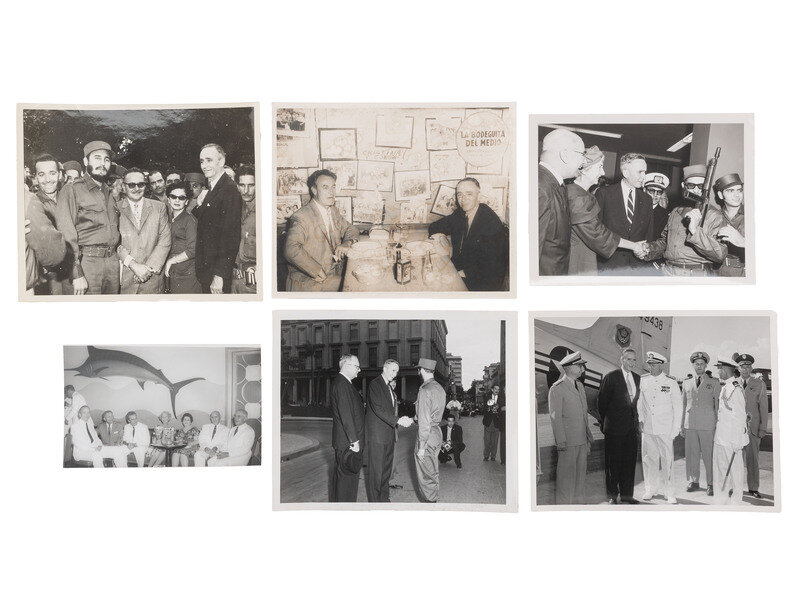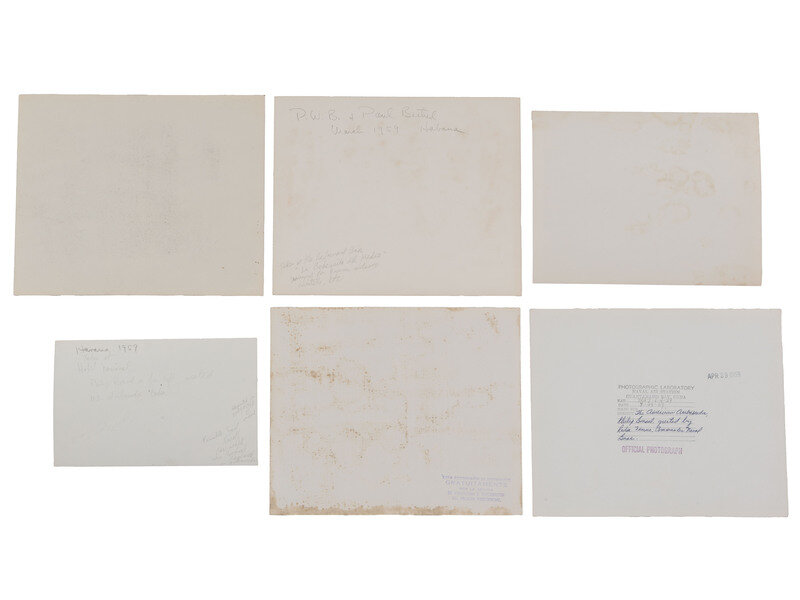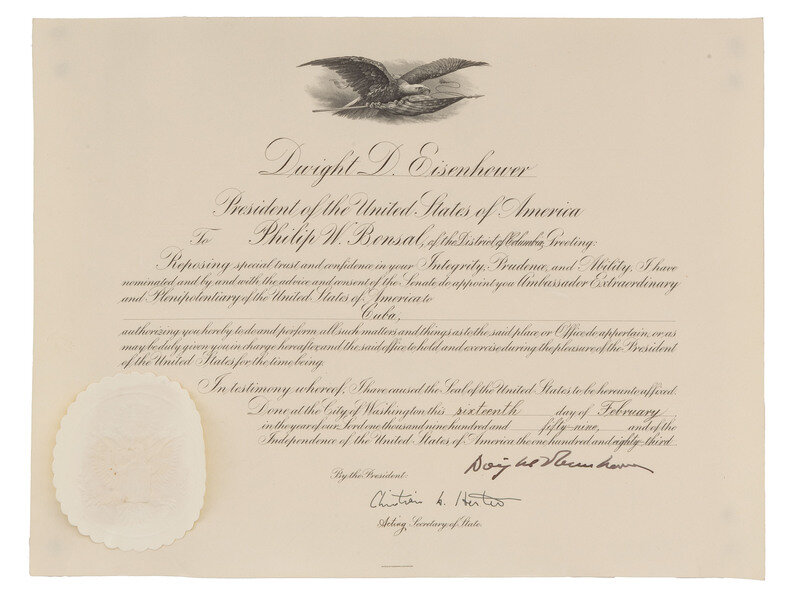Condition Report
Contact Information
Auction Specialist
Lot 174
Sale 6425 - American Historical Ephemera and Early Photography, including The Larry Ness Collection of Native American Photography
Part I - Lots 1-222
Oct 23, 2025
10:00AM ET
Part II - Lots 223-376
Oct 24, 2025
10:00AM ET
Live / Cincinnati
Own a similar item?
Estimate
$800 -
1,200
Price Realized
$1,920
Sold prices are inclusive of Buyer’s Premium
Lot Description
[POLITICS - CUBA]. Archive identified to Philip Bonsal, last US Ambassador to Cuba, incl. presidential appointment signed by EISENHOWER.
Archive relating to Philip Bonsal (1903-1995) whose career in the US Foreign Service spanned 32 years. Bonsal was the last US Ambassador to Cuba, serving from 1959-60. He was also US Ambassador to Columbia (1955), Bolivia (1957-59), and Morocco (1961-62) and the author of "Cuba, Castro and the United States." (Jan. 1967). Bonsal descended from a distinguished American family, including founding fathers Gouverneur Morris and Thomas Jefferson. His father, Stephen Bonsal, Jr. (1865-1951) a Pulitzer Prize winning journalist, adventurer, and author, acted as interpreter for Woodrow Wilson during secret meetings at the Treaty of Versailles.
The archive is comprised of the following:
Bonsal’s appointment as US Ambassador to Cuba, 16 February 1959, signed by President Dwight Eisenhower, and Acting US Secretary of State Christian A. Herter. Mint condition.
Hundreds of legal size pages (both handwritten and typed) by Bonsal with background material, handwritten changes to proof copies, etc. for his publication “Cuba, Castro and the United States.” This work reflects upon his experiences in Cuba with an analysis of the Cuban and US relationship during the Batista and Castro regimes. It includes a discussion of Castro's personality, his increasing animosity toward the US, Bonsal’s unsuccessful attempts to find rational common ground between Castro and the US, and the termination of diplomatic relations between the US and Cuba. Included are four copies of this published work with one bearing the presentation “For Dick affectionately Phil.”
Numerous “official” photographs (e.g., US Navy, the Cuban Presidential Palace, etc.), mostly 8 x 10 in. Includes photos of Bonsal’s arrival at Guantanamo Bay, presenting his credentials to Manuel Lleo, the President of Cuba’s Revolutionary Government (Lleo resigned after 197 days because of disputes with Castro), Castro in army fatigues with Bonsal on a crowded street, other Cuban revolutionaries in fatigues. Other informal photos depict Bonsal with Earl Smith (former Ambassador) at the Hotel Nacional (depicted in the movie Godfather II); a couple of mounted photos from Santiago during the Spanish Am. War. Many photos have descriptions on the reverse.
Misc. publications on Cuba, including two published by the State Dept.; A scarce copy of “Pensamiento Politico, Economico y Social de Fidel Castro” published (in Spanish) by Editorial Lex, Habana, 1959; An authors presentation copy of “The Americas” (January 1980) which discusses Cuba and the exclusion of the Castro regime from the OAS (i.e., “To Ambassador Philip Bonsal with the compliments of Edward A. Jamison”).
A folder of letters signed by Hamilton Fish Armstrong, the editor of “Foreign Affairs” (publisher of Bonsal’s work), Bob Stevenson (Coordinator of Cuban Affairs), and others including Bonsal. A folder of letters from John Bartlow Martin (1915-87) US Amb. to Dominican Republic under JFK, speech writer and confidant to JFK, Johnson, RFK, and Adlai Stevenson to Philip Bonsal re edits to Martin’s upcoming book “US Policy in the Caribbean” (1978), including numerous pages of the book draft where Bonsal has penned changes and edits. A large group of material (letters and drafts) from author & historian Bryce Wood at the Brookings Institute to Bonsal about Wood’s book “The Dismantling of the Good Neighbor Policy.” Here again Bonsal supplies edits and recommendations to draft pages of Wood’s book.
Also enclosed are some of the responses by Bonsal (tissue copy responses) to questions posed by Wood, Martin, and others, which have interesting content. For example, in part “… I believe we could have avoided the break with Cuba in 1960 if we had followed the principles laid down in President Eisenhower’s statement of January 25 (quoted on page 121 of my book). The critical step was refineries in Cuba to refine Soviet oil. If we could have rolled with some of Castro’s punches, both oral and material… he might have run out of steam and the Soviets would not have felt, as they did, that there was a “movement of national liberation”… the Bay of Pigs in April of 1961 was a humiliating experience for us. The missile crisis… was entirely one between the Soviet Union and the US. The missiles were never in any sense under Castro’s control…” Some responses to letters from Merwin L. Bohan, include, in part: “… My impression is that in 1959 and 1960 [the] Cuban project was handled in an ad hoc fashion by a small group in which Vice President Nixon … was a prime figure. You are aware that Mr. Nixon in his SIX CRISES points with pride… that he was an advocate of arming and training Castro’s Cuban opponents as far back as June of 1959. A question which has not yet become of public concern is that of the relations between the Vice President and E. Howard Hunt who played quite a role in the Bay of Pigs preparations and was, I believe, the liaison between the Vice President and CIA on this matter, especially during the period when Mr. Nixon was campaigning for the Presidency in the fall of 1960. These relations might cast some light on the hiring of Hunt… after Hunt’s retirement from [the] CIA ….” “Bob Hill [former US Ambassador to various Latin Am. countries] is one of the few people … about whom my opinion is unreservedly pessimistic. Did you know that he is currently Asst. Sec. of Defense for International Security Affairs? I shudder and wonder if Dr. Kissinger does too…. Jean Daniel was responsible for the story that President Kennedy unintentionally gave Adzhubei, Khruschev’s son-in-law, the notion that the US was about to invade Cuba, and that Adzhubei conveyed to Castro his misinterpretation of what the President had told him with the result that Castro then persuaded the Russians to install the well known missiles…. I share your admiration for President Kennedy. I believe that to have used American armed forces overtly to throw out Castro would have landed us in an impossible situation...”
An impressive archive with strong content.
This lot is located in Cincinnati.







